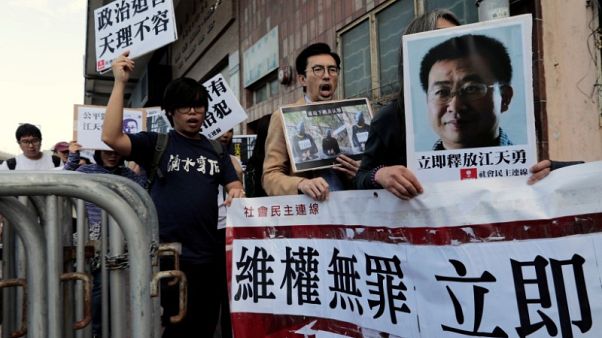
GENEVA – United Nations experts called on China on Friday to provide medical care to Jiang Tianyong, a prominent human rights lawyer jailed for inciting “subversion”, amid reports of his deteriorating health.
In a rare joint statement on China, six independent human rights experts voiced deep concern at the condition of Jiang, sentenced to two years jail last November after being found guilty of inciting subversion of state power.
“Mr. Jiang’s health has apparently deteriorated dramatically in recent months. He is reportedly weak and suffers from severe memory loss, and it is suspected that he may have been drugged,” the experts said.
“This raises fears of torture or ill-treatment in detention, without access to adequate medical care.”
Xi Jingping has overseen a sweeping crackdown on human rights activism in China since 2015 that has seen hundreds of rights lawyers and activists detained, dozens arrested and some handed lengthy prison sentences.
Jiang, who provided legal defence for some of the lawyers arrested in the crackdown, had already been disbarred in 2009 and disappeared in November 2016.
Xi Jingping has overseen a sweeping crackdown on human rights activism in China since 2015 that has seen hundreds of rights lawyers and activists detained, dozens arrested and some handed lengthy prison sentences.
Jiang, who provided legal defence for some of the lawyers arrested in the crackdown, had already been disbarred in 2009 and disappeared in November 2016.
He was held in secret detention for more than nine months, the experts said.
Many of the nearly 250 lawyers and defenders arrested remain in detention and are “often held incommunicado”, they added.
“We appeal to the Chinese government to provide the detainees at a minimum with access to their families, lawyers of their own choosing and adequate health care,” they said.
The U.N. experts included Philip Alston, special rapporteur on extreme poverty and human rights, who met Jiang during an official visit to China in August 2016.
Many of the nearly 250 lawyers and defenders arrested remain in detention and are “often held incommunicado”, they added.
“We appeal to the Chinese government to provide the detainees at a minimum with access to their families, lawyers of their own choosing and adequate health care,” they said.
The U.N. experts included Philip Alston, special rapporteur on extreme poverty and human rights, who met Jiang during an official visit to China in August 2016.
Alston has voiced concern at the Human Rights Council that Jiang’s subsequent disappearance and arrest may be in part a reprisal for that contact, calling it “the equivalent of a legal sledgehammer”.
